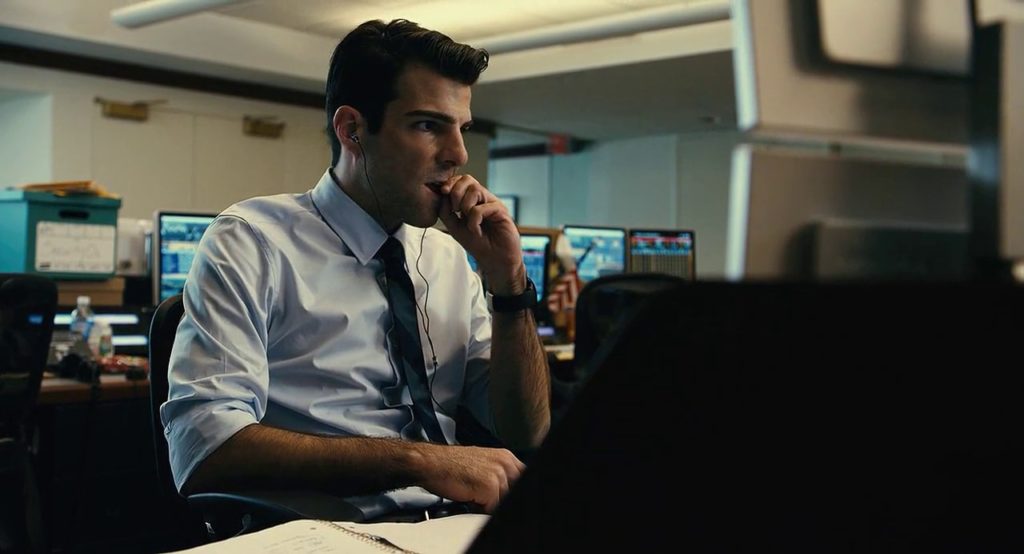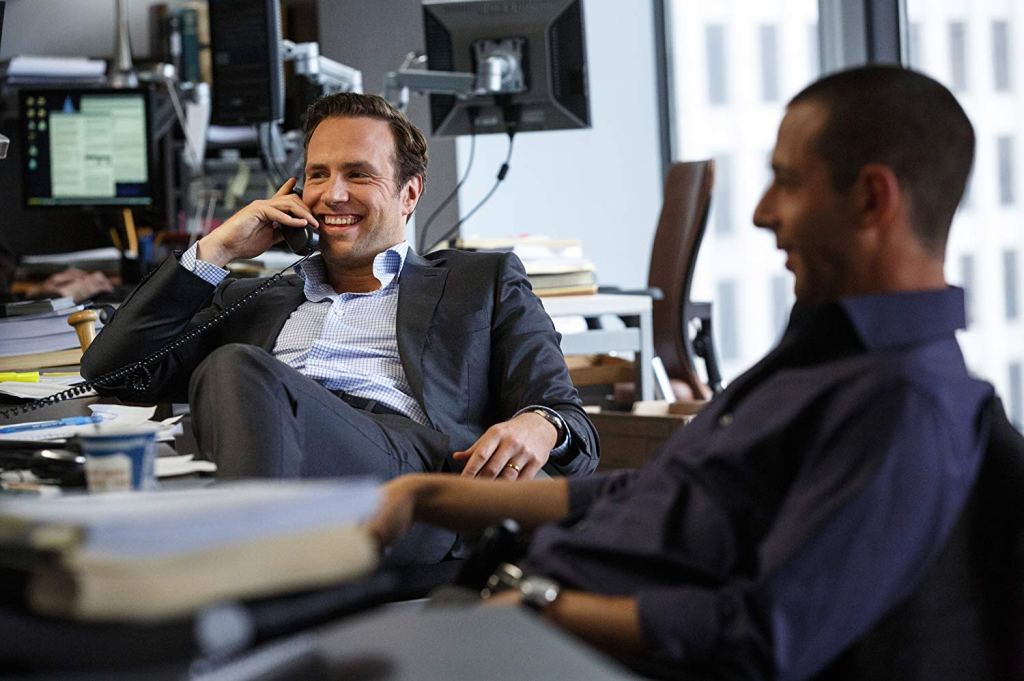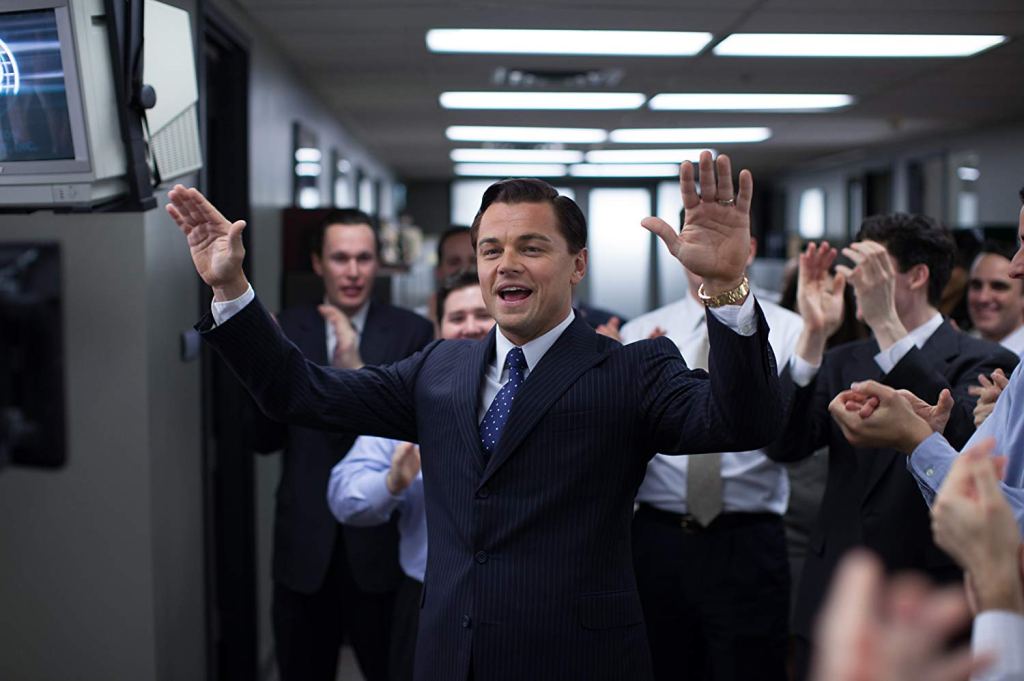I wanted to write this article for a while now, but I always stopped myself, thinking that most moviegoers might find the subject matter of financial strategy a bit too overwhelming for a nice, light “movie read”. After rewatching such great classics like Wall Street and American Psycho recently, I discovered that I had an inexplicable love for movies focusing on Wall Street, investment banking and business. I surprise even myself, I’m far from being a finance or economics major, but I do find the fluctuations of the financial market highly interesting when explored on the Big Screen. Although some movies require many viewings and the scripts are very technical, there is a sophisticated and intellectual implication of the audience that is highly gratifying for anybody.
Sadly, considering the current COVID-19 crisis around the world, maybe it’s the best time to watch, read and listen on the huge capitalism machine under which we operate…and why it is so fragile in times of great uncertainty. To do so, I have selected a few Hollywood movies that explore this world, each in their own different point of view. Most of them are now instant classics, so I guarantee you it’s not so boring.
Margin Call (2011) and the first signs of the financial crisis

I want to start with Margin Call (2011) because I feel this is the one that feels more “actual” considering our modern times. Of all my favourite movies on the subject, this one is definitely the most subtle, as we are behind closed doors, in conference rooms, most of the time. It brilliantly depicts the first stages of the real estate crisis of 2008, when only a few corporate executives in investment firms knew what was coming, but the general public had no idea yet. Basically, a few hungry portfolio managers are having a tough financial quarter, as many of their colleagues are being let go the same day. One of them still at work, a brilliant analyst played by Zachary Quinto (Spock in the most recent Star Trek movies), discovers a great anomaly in the financial projections of the firms and warns his colleague of an inevitable financial disaster. Word to mouth does its job, as it goes from employee to supervisor, to Supervisor to Vice-President and Vice-President to the firm’s CEO and Chairman (the absolutely great Jeremy Irons). Basically, the whole movie consists of meetings, corporate chats and internal crisis management between different employees of the same company, while they try to decide how to resolve this with the minimal impact for them and their jobs. It might sound a bit boring presenting it like that, but it’s the very opposite. The stakes are so high that nobody really takes the time to describe what is happening or how only that it is so big that the entire market will crumble! The script is solid and it brings a very good dose of realism to it all.
What I love about this one is that it feels so real actual; you can literally imagine this kind of a scenario in a real investment firm in Wall Street at that time. We do discover that these guys are financial geniuses and probably smarter than a lot of people in how to manage money, but they are also very human and incapacitated. They know that their actions might be terribly disastrous for thousands and thousands of investors and particulars, but still decide to move forward with extremely difficult decisions…where no one really wins. Before panic goes through the roof among the masses, this perfectly represents the first stages of a crisis by pointing the finger to a few guilty parties who might have triggered it.
On a lighter note, this movie is highly underrated and I strongly encourage you to watch it during your quarantine time at home!

The Big Short (2015) and the craziness of American capitalism

Even though The Big Short (2015) is completely unrelated to Margin Call, it is a fitting continuation to the tale of the 2008 financial crisis. This absolutely brilliant film (one of my favourites of the last decade to be honest) happens a little earlier, a few years before the crisis, where the word starts to get out among other financial firms and traders that the real estate market is fraudulent. Before the market actually crashes, all of the different lead characters, strategically placed in different companies and cities, decided to do the unthinkable: bet against the housing market to make more money, but also try to warn the banks.
Fair warning, this movie is very complex and technical, which might be too much for most people who have no idea how the financial market works. However, director Adam McKay added just the right amount of humour and sarcasm to make it incredibly entertaining as well. This movie discussed in great detail the concept of bonds, investment strategy, market fluctuation and, most importantly, the toxic debt fuelled by the real estate market in America before the 2008 crisis. Actually, I felt so wise after watching this movie that I had the idea to consult my few friends in finance and ask them if the findings of the movie were true…it appears that they were!
Without being too depressing, the true genius of the script behind The Big Short, which is adapted from a book on the subject, is that it reflects the insanity behind the speculative capitalist market. We, North Americans, make instinctive decisions to allow ourselves to accumulate many debts and have access to an incredible amount of mortgage loans only by pure speculation because the market is «solid». It takes only one solid drop in the stock market to make millions of dollars disappear and see innocent Americans out of capital.
Among all the movies on my list, this might be my favourite, you have to watch this! So well-written, so thoughtful and well-acted, it’s a crazy ride into our capitalist mentality and our spending habits.

Wall Street (1987) and Wall Street: Money Never Sleeps (2010): greed is good!

Perhaps the most popular franchise in this list, Wall Street, directed by the great war veteran Oliver Stone, sets the rules for contemporary movies about finance. Both the original movie, Wall Street (1987), and its sequel, Wall Street: Money Never Sleeps (2010), explore the world of the American stock market through the eyes of stockbrokers (respectively played by Martin Sheen and Shia LaBoeuf). Both of these young and ambitious men are to reflect the average taxpayer in search of the American dream and access to wealth. To do this, they will refer to the ultimate Wall Street mogul famously known as Gordon Gekko (excellent Michael Douglas) for coaching and guidance, which will inevitably lead to their demise. The moral behind this is pretty simple: the American market is fuelled by greed, which is why it is so good to always want more. Greed is the true currency of the market and without it, nothing can work in our modern-day. Also, as we follow these characters in the corporate shark tank to make profits, they will discover that it might be simple to be rich, but is it still if they wish to play by the rules…? That is why the characters will easily fall into insider trading and stock manipulation.
There are so many philosophical learnings to be discussed from these movies, but perhaps the biggest is that capitalism creates nothing; it is purely money moving from one pocket to another. Wall Street investment bankers working for Gordon Gekko and his team only react through speculation, while earning a big commission out of every trade.
The first movie doesn’t cover the financial crisis but more so the economic boom of the 1980s was too few trades were regulated in the USA, allowing the investment brokers to speculate as they want and achieve insider trading easier. However, interestingly, the sequel does happen during the crisis of 2008, speculating on the effects of greed on the market and how leveraged debt and speculation doesn’t work in the long term.

The Wolf of Wall Street (2013) and the harsh excess of wealth in America!

Even if I don’t consider The Wolf of Wall Street (2013) of Martin Scorsese a finance movie per se, it would be a bit unfair to completely leave it out of my list. Based on the very funny book by ex-millionaire Jordan Belfort, this movie portrays the rise and fall of a Wall Street mogul. Jordan (played by Leonardo DiCaprio) launched a very successful investment banking firm in the 1990s, right after the crash of 1987. Discovering a very clever of making incredibly big commissions out of the sale of penny stocks, Jordan and his crew of money-hungry salesmen all become rich and highly successful. However, while some rich millionaires on Wall Street live a more sophisticated life, Jordan chooses a life of excess, drugs, sex and booze…all day long! In other words, this is Gordon Gekko on acid. Crashing sports cars, sinking 170-foot yacht in the ocean and flying to Las Vegas in a plane full of hookers, nothing is too crazy in the world of Jordan Belfort.
Although this movie partially covers investment strategies and stock manipulation just enough for a newbie to understand, it never really details the functionality of it all. This movie is mostly concerned about the psychological downsides of extreme wealth and how greed can completely ruin human beings. Like Martin Scorsese likes to tell his stories, this is mostly a human drama rather than an exploration of why American capitalism can be faulty.
Of course, this movie is often ranked as one the best of the last decade, so we need to enjoy it and respect for great storytelling and acting (thanks to Leonardo DiCaprio and Jonah Hill).

Here we go! That should keep us occupied during the COVID-19 crisis.
Enjoy these movies.
